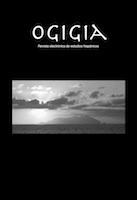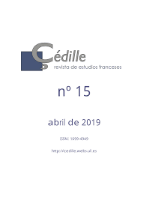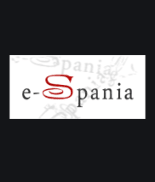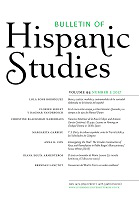
Ogigia-Revista Electronica de Estudios Hispanicos
Scope & Guideline
Navigating the Landscape of Linguistics and Education
Introduction
Aims and Scopes
- Interdisciplinary Research in Hispanic Studies:
The journal publishes works that bridge literature, linguistics, education, and cultural studies, encouraging a multidimensional view of Hispanic literature and its implications. - Focus on Gender Studies and Representation:
A consistent theme is the examination of gender roles and representation in literature, particularly the contributions of female authors and the portrayal of women in various texts. - Educational Approaches and Literary Pedagogy:
The journal emphasizes innovative educational methodologies and the integration of Hispanic literature into teaching practices, particularly in secondary and primary education. - Historical and Cultural Contextualization:
Papers often explore the historical and cultural contexts of Hispanic literary works, examining their relevance and impact on contemporary society. - Lexical and Linguistic Analysis:
There is a robust focus on linguistic studies, including lexical competence, grammatical structures, and comparative analyses of language functions across different cultures.
Trending and Emerging
- Technological Integration in Education:
Recent publications focus on the role of new technologies in education, particularly their application in teaching Hispanic literature and language, highlighting the importance of digital literacy. - Contemporary Issues in Gender and Identity:
There is an increasing emphasis on gender studies, particularly the representation of women and LGBTQ+ identities in literature, reflecting broader societal conversations around inclusivity and representation. - Intertextuality and Adaptation Studies:
Emerging research explores intertextual connections within literature, particularly adaptations of classic works into contemporary formats, showcasing the evolving nature of storytelling. - Critical Analysis of Cultural Narratives:
Papers are increasingly analyzing cultural narratives within Hispanic literature, examining themes of race, identity, and social justice, which resonate with current global discussions. - Comparative Literature Studies:
There is a growing trend towards comparative studies that analyze Hispanic literature in relation to other cultural literatures, emphasizing cross-cultural dialogues and influences.
Declining or Waning
- Traditional Literary Canon:
There is a noticeable decrease in studies focusing solely on traditional canonized works of Hispanic literature, suggesting a shift towards more contemporary and diverse voices. - Historical Literary Analysis:
While historical analysis remains important, there has been a decline in papers that focus exclusively on historical literary movements without connecting them to modern implications or interdisciplinary approaches. - Purely Linguistic Studies:
Research that delves into purely theoretical linguistic constructs without application to literary or educational contexts appears to be less prominent, indicating a preference for applied linguistic studies.
Similar Journals

Libros de la Corte
Pioneering Open Access Scholarship from the Heart of EuropeLibros de la Corte, an esteemed publication originating from the Universidad Autónoma de Madrid's Instituto Universitario La Corte en Europa, represents a vital resource in the fields of History, Literature and Literary Theory, and Visual Arts and Performing Arts. Since its establishment, this Open Access journal has been pivotal in disseminating innovative research and critical analyses, making scholarly works accessible to a global audience since 2009. With an impressive Scopus ranking that places it within the top quartiles across multiple categories, including a Q1 ranking in 2023 for both Literature and Literary Theory and Visual Arts and Performing Arts, this journal maintains a strong influence and reputation among peers. Additionally, its location in Madrid, Spain enhances its cultural and academic significance, positioning it at the heart of European literary discussions. Researchers, professionals, and students alike will find Libros de la Corte to be an invaluable platform for exploring and contributing to the ongoing dialogue in these rich fields of inquiry.

Cadernos de Letras da UFF
Connecting Scholars Through Critical Literary AnalysisCadernos de Letras da UFF is a prominent academic journal published by the Department of History at the Federal University of Fluminense in Brazil. Since its transition to Open Access in 2014, it has fostered a spirit of collaboration and dissemination in the field of Literature and Linguistics, welcoming contributions that explore various aspects of literary studies, historical literature contexts, and linguistic phenomena. With a commitment to quality and academic rigor, the journal serves as a vital resource for scholars, practitioners, and students engaged in the humanities. The journal is dedicated to the advancement of knowledge through innovative research and critical analyses, making it an essential platform for sharing ideas with a global audience. The journal is based in Niterói, RJ, Brazil, and is indexed in various academic databases, enhancing its visibility and impact within the scholarly community.

Cedille-Revista de Estudios Franceses
Exploring the Depths of Linguistics and LiteratureCedille-Revista de Estudios Franceses is a prominent academic journal published by the ASOC PROFESORES FRANCES UNIV ESPANOLA-APFUE and has established itself as a vital resource in the fields of Linguistics and Language and Literature and Literary Theory. Since its inception in 2005, this Open Access journal has provided a platform for rigorous scholarly articles and critical studies focused on French studies, fostering both research and discussion among academics from around the globe. Originating from Santa Cruz de Tenerife, Spain, Cedille has garnered a respectable impact factor and ranks in the second quartile for Linguistics and Language and the first quartile for Literature and Literary Theory in 2023. With converged years from 2009 to 2024, the journal aims to advance understanding and appreciation of French literature and its linguistic intricacies, serving as a vital forum for researchers, professionals, and students committed to the exploration of French culture and language studies.

REVISTA DE ESTUDIOS HISPANICOS
Exploring the Rich Tapestry of Hispanic CultureREVISTA DE ESTUDIOS HISPANICOS is a distinguished academic journal published in the United States, dedicated to the exploration of Hispanic studies through a multifaceted lens that encompasses literature, cultural studies, and the performing arts. Established to serve as a platform for innovative research and critical discourse, this journal presents a vibrant collection of peer-reviewed articles that contribute to the understanding of Hispanic cultures and their global impact. With an ISSN of 0034-818X, the journal operates from the esteemed Washington University in St. Louis, providing a scholarly refuge for researchers and students alike. Despite its Q4 status in Cultural Studies, it boasts commendable positions in both Literature and Literary Theory and Visual Arts and Performing Arts (Q3), reflecting its evolving influence in these fields. Although currently not an open-access publication, it remains accessible for institutional subscribers and dedicated scholars eager to delve into its rich content. The REVISTA DE ESTUDIOS HISPANICOS aims to foster dialogue and interdisciplinary research, making it an essential resource for anyone committed to advancing knowledge and appreciation of Hispanic heritage and arts.

Revue Italienne d'Etudes Francaises
Unveiling New Perspectives in French Literature and LinguisticsRevue Italienne d'Etudes Francaises, published by SEMINARIO FILOLOGIA FRANCESE, is a pivotal open access journal dedicated to the exploration and analysis of French studies within the broader context of history, linguistics, and literary theory. Since its inception in 2011, this journal has fostered scholarly dialogue and critical discourse, offering a platform for researchers, professionals, and students alike to disseminate their work and engage with contemporary issues in these fields. With an ISSN and E-ISSN of 2240-7456, the journal has established itself within the academic community, although it currently ranks in the lower quartiles across various disciplines, as indicated by its Scopus metrics. Nevertheless, the Revue Italienne d'Etudes Francaises remains an essential resource for those seeking to deepen their understanding of Francophone literature, culture, and linguistic dynamics from its base in Rome, Italy, at C/O Fondazione Primoli. As the field of French studies continues to evolve, this journal plays an important role in highlighting the latest research findings and theoretical advancements.

Criticon
Fostering vibrant scholarship in the humanities.Criticon is a distinguished open-access journal published by PRESSES UNIV MIDI-PUM in France, dedicated to advancing scholarship in the fields of History and Literature and Literary Theory. Since its transition to open access in 2014, Criticon has fostered a vibrant academic community, enabling the dissemination of high-quality research that contributes significantly to contemporary discourse. Positioned within the Q4 categories for both History and Literature, the journal boasts impressive rankings, including #152 out of 1106 in Literature and Literary Theory, reflecting its growing influence with a remarkable 86th percentile standing. With a dedication to interdisciplinary scholarship, Criticon invites researchers, practitioners, and students to submit original articles that explore the intersections of literary and historical narratives, thereby enriching the understanding of cultural and intellectual history. Located at 5 ALLEES ANTONIO MACHADO, F-31058 TOULOUSE, FRANCE, this journal not only serves as a platform for new voices but also as a beacon for established scholarship in the humanities.

Cuadernos de Linguistica Hispanica
Championing Quality Research in Hispanic LinguisticsCuadernos de Linguistica Hispanica is a distinguished open access journal published by UNIV PEDAGOGICA & TECNOLOGICA COLOMBIA, dedicated to advancing research in the field of linguistics and language studies since its inception. With an ISSN of 0121-053X and E-ISSN 2346-1829, this journal has established itself as an important platform for scholars to share innovative findings and insights within the linguistics community. As a Q3-ranked journal in linguistics and language according to 2023 category quartiles, it occupies a significant position in Scopus rankings, showcasing its commitment to quality and relevance. With the aim to foster scholarly discourse and promote understanding of the Hispanic linguistic landscape, the journal welcomes contributions that explore a diverse range of topics and methodologies. The journal has embraced open access since 2008, ensuring that research is accessible to a broader audience, thus enhancing its impact and engagement within both academic and professional spheres.

E-Spania-Revue Electronique d etudes Hispaniques Medievales
Illuminating the Complexities of Medieval Hispanic WorldsE-Spania-Revue Electronique d'études Hispaniques Medievales, published by UNIV PARIS IV-PARIS-SORBONNE, is a prominent scholarly journal dedicated to the exploration of medieval Hispanic studies. With its Open Access format established since 2006, the journal facilitates the dissemination of research and critical discourse in the field, creating a vibrant platform for academics, researchers, and students alike. With an ISSN of 1951-6169, this journal aims to foster interdisciplinary dialogue surrounding the rich tapestry of medieval Spanish literature, history, and culture. Situated in the heart of Paris, this journal not only seeks to enhance knowledge production but also encourages collaboration among scholars globally, contributing to the ever-growing landscape of Hispanic studies. Through its commitment to accessibility and scholarly rigor, E-Spania remains an invaluable resource for those invested in understanding the complexities of the medieval Hispanic world.

BULLETIN OF HISPANIC STUDIES
Navigating the Landscape of Hispanic Cultures and LinguisticsBULLETIN OF HISPANIC STUDIES, published by Liverpool University Press, is a distinguished peer-reviewed journal dedicated to the exploration of Hispanic cultures, literatures, and linguistic studies. With an ISSN of 1475-3839 and an E-ISSN of 1478-3398, this journal is a vital platform for researchers, scholars, and students alike, offering critical insights and innovative research from a broad spectrum of perspectives within its fields. Notably, as of 2023, it holds a commendable position in Q2 of Linguistics and Language and Q1 in Literature and Literary Theory, demonstrating its significant impact in these disciplines. The journal spans a period from 2002 to 2024, providing a rich historical arc of scholarship in Hispanic studies. It operates in the United Kingdom and remains accessible through subscription-only models, ensuring a quality curation of content. With a native address at 4 Cambridge St, Liverpool L69 7ZU, England, the BULLETIN OF HISPANIC STUDIES remains committed to advancing knowledge and fostering dialogue in the ever-evolving landscape of linguistic and literary inquiry.

Philologica Canariensia
Illuminating the vibrant fields of literature and language.Philologica Canariensia is a distinguished academic journal published by the University of Las Palmas de Gran Canaria, focusing on the vibrant fields of Literature and Literary Theory as well as Linguistics and Language. With an impact factor that positions it in the Q1 and Q2 quartiles in its respective categories as of 2023, the journal has established itself as an important platform for scholarly communication and research. Since transitioning to Open Access in 2014, it has broadened its reach, allowing researchers, professionals, and students from around the globe to access high-quality publications without barriers. With a commendable presence in Scopus rankings, including a rank of #309 out of 1106 in Literature and Literary Theory, Philologica Canariensia aims to foster an interdisciplinary dialogue and advance knowledge in the humanities. The journal's commitment to publishing innovative research makes it an essential resource for anyone engaged in exploring linguistic and literary phenomena.